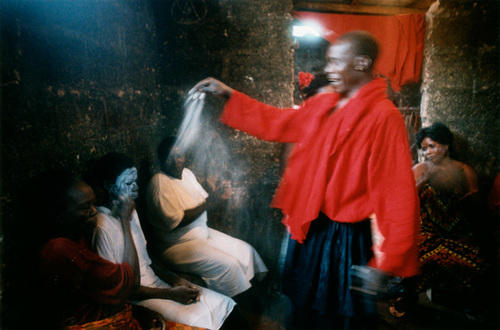
Report: Nigerian Black Axe criminal gang expands in Switzerland

A Nigerian criminal network known as Black Axe is becoming increasingly active in Switzerland, with over 100 members, and is expected to continue to expand, according to a media report.
An in-depth articleExternal link published on Monday by the Neue Zürcher Zeitung (NZZ) said the Federal Office of Police expects the number of gang numbers to expand in the Alpine country.
“The Nigerian brotherhoods will probably continue to grow,” it told the paper.
The Black Axe gang began as a student movement in Benin City in the 1970s but has since evolved into a global criminal network that specialises in online fraud. It is also active in drug and human trafficking and money laundering, the NZZ writes.
Interpol warnsExternal link Black Axe is rapidly becoming a major security threat worldwide. The Nigerian gang and similar groups are responsible for the majority of the world’s cyber-enabled financial fraud as well as many other serious crimes.

More
In Europe, Nigerian prostitutes are held captive by ‘black magic’
Women trapped in prostitution
NZZ journalists traced the Nigerian network to Zurich’s Langstrasse district, where Swiss trafficking organisations say Nigerian women are forced into prostitution in moves orchestrated by Black Axe members.
According to a report by Stephan Fuchs, co-director of the NGO Trafficked Victim UnitExternal link, hundreds of young Nigerian women, some of them still minors, turn up on Langstrasse, work and then disappear.
He recently wrote a report on human trafficking and the Nigerian mafia for the Federal Office of Police, which describes how Black Axe has spread in Switzerland in recent years. The report says none of the Nigerian women in Zurich prostitute themselves voluntarily. It says it usually takes five to eight years for the women to pay off debts of between €60,000-80,000.
It is hard for the women to escape this situation, especially as Black Axe has a global network of informers: “No matter where women go in the world, there are always Black Axe members who follow them, watch them and catch them again,” said Fuchs.

More
Swiss warned against online love traps
In a major operation in October, coordinated by Interpol in 14 countriesExternal link, police arrested more than 70 alleged fraudsters linked to the Black Axe gang in South Africa, Nigeria and Ivory Coast – as well as in Europe, the Middle East, south-east Asia and the United States.
The Guardian newspaper in Britain reported that a regional hub in South AfricaExternal link was reportedly officially recognised by the Black Axe leadership in 2013, according to US legal documents viewed by the paper.

In compliance with the JTI standards
More: SWI swissinfo.ch certified by the Journalism Trust Initiative

























You can find an overview of ongoing debates with our journalists here . Please join us!
If you want to start a conversation about a topic raised in this article or want to report factual errors, email us at english@swissinfo.ch.